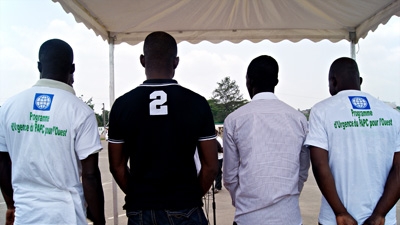ABIDJAN, May 8, 2012—The World Bank-funded Post-Conflict Assistance Project (PCAP) was launched in 2007 to help finance the Government of Cote d’Ivoire’s Crisis Recovery Program, a comprehensive plan included in the 2007 Ouagadougou Peace Agreement that laid out a plan for ending the country’s longstanding crisis. The project aimed to contribute to the national identification process and to improve economic opportunities and access to basic social services for conflict-affected communities and individuals associated with armed groups.
“The project launched in the period when Cote d’Ivoire’s development partners had suspended relations with the country,” said the World Bank’s task team leader for the project Senior Operations Officer Emmanuel N. Noubissie. “But the Bank felt strongly that financing the country’s efforts was important to its economic and social recovery.”
Jobs for Youth
Since its launch, PCAP has focused on young people who fought during the crisis. The range of services available to them includes the provision of jobs, training and managerial capacity programs.
“The jobs give these young people an opportunity to earn a living with dignity,” said Noubissie. “They are exposed to a normal lifestyle that doesn’t involve weapons and the most enterprising among them have managed to use their earnings to build a nest egg for an income-generating activity, or to obtain more advanced professional training.”
Job types include road maintenance, sanitation projects, and public building maintenance, and target individuals between the ages of 18 and 40. Although contracts are short-term (six months at most), the results have been encouraging.
“When the conflict started many of my friends and I had no employment prospects,” said Ticouho Sonza Lucien, a beneficiary of the reintegration program funded by PCAP.
Today, despite years of enrollment in local militias, Lucien is earning money working with PCAP to build social cohesion and peace building.
The Difficult Path to Demobilization
The PCAP project has not been without challenges, according to Kouassi Clement, assistant coordinator responsible for PCAP’s economic reintegration component. Many program participants have asked for longer contracts and higher wages.
“In a post-crisis context where a large number of young people are unemployed, we have had to field a multitude of requests,” Clement said. “Our strategy is now aimed at providing assistance to young former combatants with training and capacity building to enhance their long-term employability.”
Data has also been an issue for implementation. While many agree that a need exists to reintegrate former combatants, no one knows their exact number.
“In the aftermath of the war, although everyone talks about ex-combatants, it is difficult to reach them and assist them with the reintegration process,” Noubissie said.
According to Noubissie, a database of ex-combatants does exist but has not been made available to the public.
“The project was launched in 2008,” Noubissie said. “Our objective was to reach 24,000 ex-combatants and at-risk youth by December 31, 2011. Thus far, we have fallen well short of this figure owing to problems with access.”
Going forward, program coordinators hope to expand the program beyond Abidjan into other areas hard hit by crisis. Already, 18,000 ex-combatants and youth have received services. Another 30,000 are expected to benefit by the end of June 2013.

